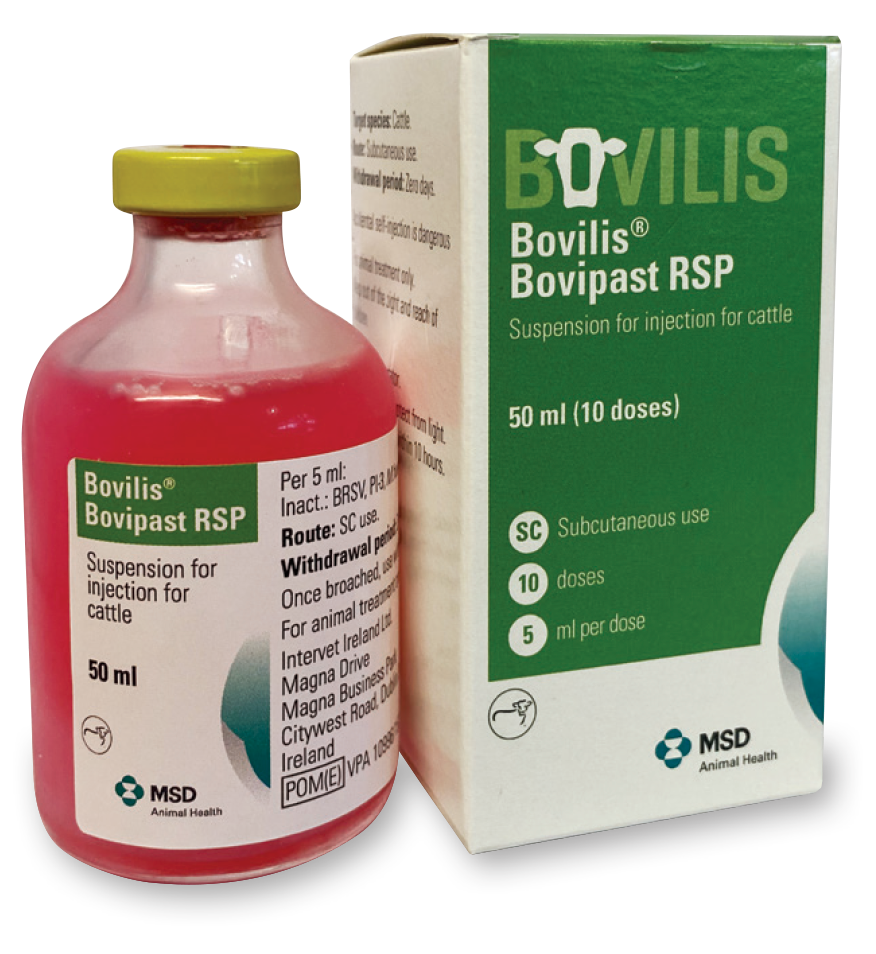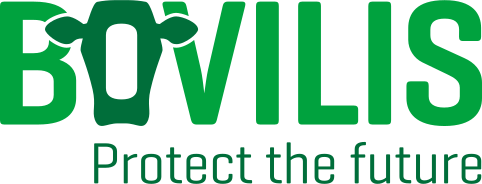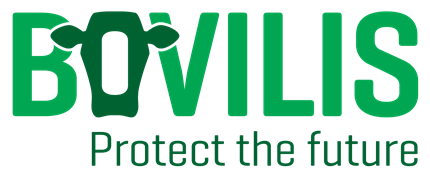
What is it?
Bovilis Bovipast RSP provides protection against viral and bacterial causes of pneumonia. RSV and PI3 are viruses often isolated in pneumonia in calves. Mannheimia haemolytica can often be the principal bacterial agent implicated in pneumonia. Bovilis Bovipast RSP provides the broadest protection against Mannheimia haemolytica
How to use:
Dose: 5 ml
Route of Administration: Subcutaneous use. Injection into the side of the neck.
Animals from approximately 2 weeks of age should receive two vaccinations separated by
an interval of approximately 4 weeks.
Booster doses: If booster doses are required, a single dose should be given approximately
2 weeks before each risk period (e.g., transport, introduction into a herd, change of housing).
The vaccine must be shaken well before use.
Bovilis Bovipast RSP can be administered on the same day as, but not mixed with Bovilis IBR Marker Live in cattle from 3 weeks of age onwards.
Withdrawal period(s): Zero days.
Why use Bovilis Bovipast RSP?
Year after year, in Ireland, respiratory disease continues to be the number one cause of
death in cattle greater than one month of age.
An episode of bovine respiratory disease (BRD) can have long-lasting effects. Studies have
shown that heifers with a history of respiratory disease had a 525L decrease in milk
production and a 15-day delay start in their first lactation. Beef calves can take 59 days
longer to finish if they have had pneumonia early in life.
One study found that Mannhemia haemolytica serotypes A1 and A6 account for 30% and
63% respectively of Mannhemia haemolytica infections. Bovilis Bovipast RSP provides the
broadest range of cover available against Mannheimia haemolytica, protecting against both
A1 and A6 serotypes.
How Does it Work:
Bovilis Bovipast RSP works by stimulating the body to produce antibodies against
Mannheimia haemolytica, RSV and PI3.
Mannheimia haemolytica bacteria need iron in order to reproduce and have iron-regulated
proteins (IRPs) present on their surfaces, which facilitate the absorption of iron.
When Mannheimia haemolytica bacteria reach the lungs in cattle vaccinated with Bovilis
Bovipast RSP, antibodies are already present. The antibodies attach to these IRPs,
hampering the intake of iron and leading to a reduction in bacteria numbers and clinical
signs of pneumonia.
Related Video
To activate the video player please allow cookies in category ‘Performance and Operation’ and refresh this page.
Related Articles
- Technology for Profit competition #TimeForTech
 We’re looking for Irelands most innovative dairy farmers! #TimeforTech Following the success of our Prevention for Profit campaign we’re excited to launch the “Technology for Profit” competition for 2025.
We’re looking for Irelands most innovative dairy farmers! #TimeforTech Following the success of our Prevention for Profit campaign we’re excited to launch the “Technology for Profit” competition for 2025. - Flies – Nuisance by name, nuisance by nature
 With temperatures slowly on the rise, next on the agenda – fly season. Impact on production and spread of disease Anyone who has worked with cattle during the summer months needs little reminding of the annoyance which flies can cause. They can be responsible for a state of unrest in the parlour for both cows … Read more
With temperatures slowly on the rise, next on the agenda – fly season. Impact on production and spread of disease Anyone who has worked with cattle during the summer months needs little reminding of the annoyance which flies can cause. They can be responsible for a state of unrest in the parlour for both cows … Read more - Reducing Abortion Rates in Your Flock: Enzootic Abortion of Ewes and Toxoplasmosis
 Eleanor Brady, MVB MRCVS, Ruminant Veterinary Manager, MSD Animal Health Many Irish flocks will experience a few abortions each year, but how many abortions is too many? Targets for abortion and overall empty rate are set at <2% and <5% respectively, although many flock owners accept rates higher than this. Approximately one third of lamb … Read more
Eleanor Brady, MVB MRCVS, Ruminant Veterinary Manager, MSD Animal Health Many Irish flocks will experience a few abortions each year, but how many abortions is too many? Targets for abortion and overall empty rate are set at <2% and <5% respectively, although many flock owners accept rates higher than this. Approximately one third of lamb … Read more

“Animal Health Ireland estimate the annual cost of BVD to Irish herds totals €102 million.”
Sign up to Bovilis® product and event information

MSD Animal Health
Red Oak North, South County Business Park, Leopardstown,
Dublin 18, Ireland
vet-support.ie@msd.com
PHONE
CATTLE DISEASES




